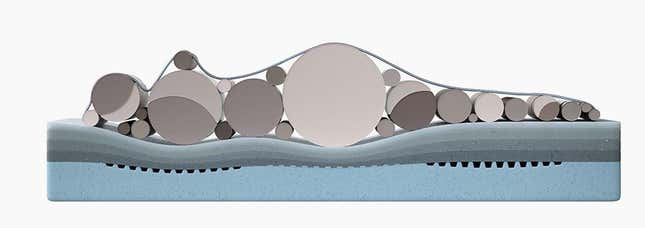Sometimes, you just need to rethink your mantra.
Fast-growing mattress start-up Casper unveiled a new mattress design this month, contradicting its own founding philosophy of a single perfect mattress for all. The second design, called the Casper Wave, is inspired by Casper’s eye-opening leap into the international market—and straight into German stubbornness. Changing a young start-up’s core premise sounds risky, but Casper says that looking at customer feedback encouraged them to evolve.
Casper launched in 2014, with a refreshingly simple premise: one universally comfortable mattress that purportedly zeroed in on just the right “Goldilocks standard” firmness. Its plan to upend the $14 billion US mattress industry pivoted on saving mattress shoppers from the befuddling and costly chore of understanding the difference “firm” vs.”luxury firm,” or “ultra plush” vs. “dream plush” options. It alleviated customers from the so-called “paradox of choice.” With the help of some genius marketing, Casper’s single-product pitch was a hit. It’s now a $750 million company mulling an IPO.
Expanding abroad was the next move. Who in the world wouldn’t want an American-made “outrageously comfortable mattress”?
Well, the Germans for one.
“The German customer prefers a much firmer mattress so we had to do things differently,” says Jeff Chapin, Casper’s co-founder and chief product officer who oversees their sleep research lab in San Francisco. “When you’re designing for that market, you’re forced to address ergonomics in a way that you’re not forced to do it in the US.”

Casper’s deep dive into human factors came soon after they launched in Europe in June 2016 and established a regional headquarters in Berlin. Germans generally prefer a no-frills foam mattresses right on top of a wooden, slotted bed frame called lattenrost. No box springs, no cushy featherbed toppers. Taschenfederkernmatratzen, American style box spring-mattresses, are available but more expensive than the standard matratzen.
The bigger lesson to Casper wasn’t about German culture, but how to rewrite your own business mantra in the face of expansion’s challenges. Casper CEO Philip Krim sees no issue in veering from their one-mattress-for-all premise, calling the shift “a natural progression” in the face of new insight and an increasingly global customer base.
Casper Labs employs 40 researchers, engineers and product designers who study real time data from 20,000 test subjects who routinely report on their sleep habits, and Krim says the consumer data they’ve been gathering for the last three years gave them the confidence to move forward with the new $1,850 mattress—nearly double the cost of their original version. ”Fast-forward three years, we now have millions of customer data points and unmatched capabilities to test and develop new products,” he explains.
Casper’s not the first to pivot to accommodate local tastes or resources: US-made Cadbury Dairy Milk bars are made sweeter than the UK versions, for example, and hipster favorite Mexican Coke delivers a palpably different sugar high from US Coke. Europe’s billion dollar e-commerce fashion outlet Zalando rearranges elements on each country-focused website depending on the culture-specific consumer behavior in each of their seven markets. Even reliably consistent IKEA customizes its catalogue and store displays for different market. Krim tells Quartz that after two weeks since unveiling the Wave in the US and Canada, the response has been “overwhelmingly positive.” “We are running through inventory incredibly quickly.”
